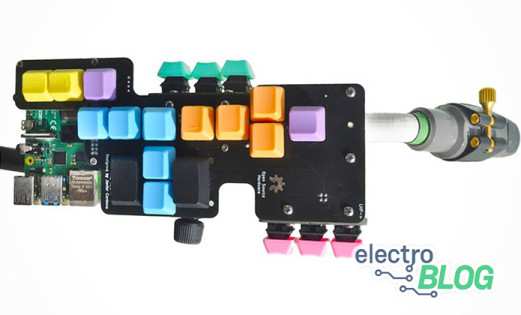The IndieDroid Nova: Looks like a Tank, Is One.
The Indiedroid Nova seems to be yet another Single Board Computer (SBC) based on the Rockchip RK3588S chipset, in the familiar form factor of the Raspberry Pi 4. However, it's not just a carbon copy, as it has some impressive features. You can fit up to 16GB of RAM on this board, and it also includes a heatsink that doubles up as a protective cover, which is an interesting idea. Additionally, an optional swappable eMMC module can provide up to 64GB of storage capacity, giving you plenty of space to store your data.
We chat about it and ETA Prime's recent video on the Nova in this week's Electromaker Show on YouTube:
The Nova board has a port layout that should feel familiar to Raspberry Pi 4 users, with one notable exception. One of the micro HDMI ports has been replaced by a USB Type-C port (no bad thing, in my opinion), which includes support for DisplayPort. Other than that, there's a Gigabit Ethernet port, WiFi 5, and Bluetooth 5.0 connectivity, as well as two USB 3.0 ports, two USB 2.0 ports, and MIPI CSI and DSI connectors.
Here's ETA Prime's video on the Nova:
Naturally, it's pretty decent as a retro gaming rig too! Overall, it looks like a pretty solid option for anyone looking for a Raspberry Pi alternative with some extra bells and whistles.
The IndieDroid Nova - in Specs
From the specs alone, it's clear this board is more powerful than the Raspberry Pi 4, though many boards out there can claim this, and they are generally priced accordingly. One thing that struck me was that this board's general setup was a little familiar. As CNX Software points out, this is the exact same spec as the 9Tripod Pico PC V2.0, a board which, until recently, was available on AliExpress and didn't feature the full-body heatsink.
That heatsink, by the way, features screw holes for a fan for even more heat dissipation, which comes included with each board.
| SoC | Rockchip RK3588S |
| CPU | Octa-core processor with 4x Cortex-A76 cores running at up to 2.2-2.4 GHz, and 4x Cortex-A55 cores up to 1.8 GHz |
| GPU | Arm Mali-G610 GPU featuring OpenGL ES 3.2, OpenCL 2.2, and Vulkan 1.2 support |
| VPU | 8Kp60 video decoding, 8Kp30 video encoding |
| AI accelerator | The SoC featuring a built-in 6 TOPS NPU |
| System Memory | 4GB, 8GB, 16GB LPDDR4 |
| Storage | MicroSD Optional eMMC 5.1 flash adding 8GB, 16GB, 32GB, 64GB, or 128GB storage |
| Video Output | 1x Micro HDMI 2.1 port DisplayPort over USB type C 4-lane MIPI DSI connector |
| Camera I/F | MIPI CSI connector (4 lane or dual 2 lane) |
| Audio | 3.5mm headphone jack |
| Networking | Gigabit Ethernet RJ45 Dual-band WiFi and Bluetooth 5.0 |
| USB | 2 x USB 3.0 Type-A 2 x USB 2.0 Type-A 1 x USB Type-C |
| Expansion | 40 pin Raspberry Pi HAT compatible GPIO |
| Debugging | 4-pin Serial Debugging Connector |
| Misc | Buttons for Power, Recovery, Reset, and Boot Power LED, User LED RTC battery connector |
| Power Supply | 5V @ 3A via USB Type-C |
| Dimensions | 85 x 56mm |
While the Nova isn't really a Raspberry-Pi-Alike due to its higher power and cost, it does have similar issues to them. There isn't much in the way of documentation or getting-started guides for beginners. That said, IndieDroid does have a website for the Nova featuring specifications, and a variety of Linux, Android, and even Windows on Arm images. They recently announced they'd be shipping boards with Armbian going forward, as it's the most mature image they have for the hardware. Hopefully, OS development will continue for longer than most similar SBCs.
Currently, the IndieDroid Nova is available from ameriDroid starting at $144.95 USD for the 4GB/32GB version and going up to $224.95 USD for the 16GB/64GB version, with various options in between.














































Leave your feedback...